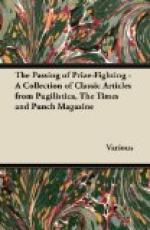* * * * *
Mr. CHRISTOPHER CULLEY, in his rather superfluous and petulant preface to Billy McCoy (CASSELL), observes that such reviewers as “may find time to skip through its pages” will probably call it a Romance. Well, skipping or not, here is one reviewer who will not disappoint him. A story of a hero who adventures into sinister places, disregards repeated warnings to “go back ere it is too late” (or the American for that entrancing formula), meets there a Distressed Damsel and kisses her as introduction, and finally, after an infinity of perils, is left with the D.D. as his B.B., or blushing bride—this I state emphatically to be not only Romance, but a most excellent brand of that article. What however Mr. CULLEY seems most to fear is that we shall think that McCoy himself and the whole setting (New Mexican scenes) are all make-believe. He need have had no such alarm in my case. I have, I remember, already commented on the admirable reality of his cowboys, as exemplified in the hero of a previous story. Billy, if just a little less convincing, is in many ways a worthy companion. But Mr. CULLEY’S heroines always strike me as inferior to his men. They have the air of hanging about in corners of the tale, and generally of being rather a nuisance than a delight to their creator. But the heroine of Billy McCoy makes hardly a pretence of being other than a lay figure; without her it would be just as entertaining and exciting, if perhaps less completely furnished for Romance.
* * * * *
While reading "Q” Boat Adventures (JENKINS) I kept on telling myself that it ought to be read in small doses if the greatest enjoyment was to be got from it; but all the same I could not let it out of my hands. “The ‘Q’ boat,” says Lieutenant-Commander AUTEN, V.C., “was a ‘stunt’ possible only to a nation of sailors. Officers might be found for ‘Q’ boats in any country with a seaboard; but men—no;” and I imagine that few Englishmen will be found to deny this statement. Elizabethan days for all their spaciousness contained nothing more incredibly brave than the exploits of these decoy boats, exploits which could only be carried out if absolutely every




